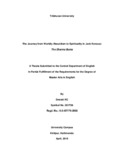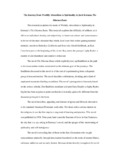Please use this identifier to cite or link to this item:
https://elibrary.tucl.edu.np/handle/123456789/3062| Title: | The Journey from Worldly Absurdism to Spirituality in Jack Kerouac The Dharma Bums |
| Authors: | KC, Dewaki |
| Keywords: | novels;literature |
| Issue Date: | 2019 |
| Publisher: | Central Department of English |
| Abstract: | This research examines the mode of a journey from worldly indulgence to spirituality in Jack Kerouac’s The Dharma Bums. This research explores the difficulty of selfhood as it affects to individual identity and subjectivity in American culture and consciousness. The novel tells the story of Ray Smith and his adventures as a hitchhiker, mountaineer, and aspiring Buddha. The novel opens with Ray Smith meeting an old bum while traveling on a freight train in California. Inspired, he calls the man a Dharma Bum and then begins to recount a series of adventures that he has undergone with other such free-spirited people. Ray attends a rowdy poetry jam at "Gallery Six" in which a number of his friends perform, but he is more impressed by the forthright poetry of Japhy Ryder. This research uses the psychological effects of absurdist condition, search for alternative sexuality in relation to the oppression of human beings by technology. The novel Dharma Bums explore the influences of media, Spirituality and Buddhism on selfhood. The text presents a distinct model for addressing the possibility for self-transformation or inherent self-limitation as encouraged by these influences. The research explores the anxiety caused by the Second World War, capitalism and the growing consumerism in America during the 1940’s and 1950’s. Buddhism provided the Beats with an escape, the ascetic lifestyle providing a way out of the conformity and absurdity of a consumer society that Kerouac encountered. |
| URI: | http://elibrary.tucl.edu.np/handle/123456789/3062 |
| Appears in Collections: | English |
Files in This Item:
| File | Description | Size | Format | |
|---|---|---|---|---|
| COVER.pdf | 15.29 kB | Adobe PDF |  View/Open | |
| chapter.pdf | 103.48 kB | Adobe PDF |  View/Open |
Items in DSpace are protected by copyright, with all rights reserved, unless otherwise indicated.
